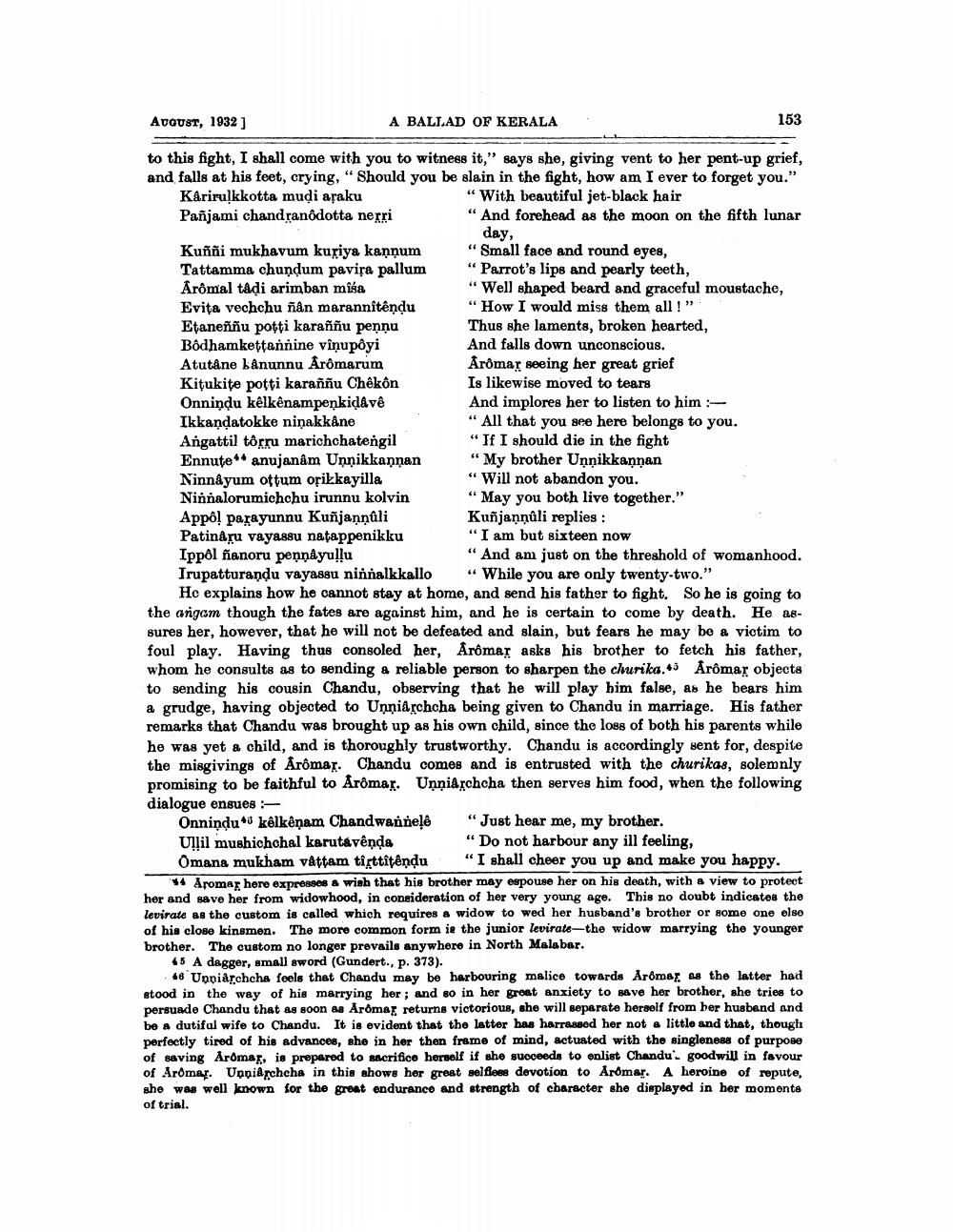________________
August, 1932 ]
A BALLAD OF KERALA
153
to this fight, I shall come with you to witness it," says she, giving vent to her pent-up grief, and falls at his feet, crying, "Should you be slain in the fight, how am I ever to forget you." Kårirulkkotta mudi asaku
" With beautiful jet black hair Pañjami chandranôdotta nerri
"And forehead as the moon on the fifth lunar
day, Kuññi mukhavum kuriya kannum "Small face and round eyes, Tattamma chundum pavira pallum "Parrot's lips and pearly teeth, Arômal tadi arimban misa
"Well shaped beard and graceful moustache, Evita vechchu ñån marannîtêndu “How I would miss them all!” Etaneññu potti karaññu pennu
Thus she laments, broken hearted, Bôdhamkettannine viņu pôyi
And falls down unconscious. Atutâne kanunnu Arômarum
Arômar seeing her great grief Kitukite potti karaññu Chêkôn
Is likewise moved to tears Onnindu kèlkenampenkida vê
And implores her to listen to him :Ikkandatokke ninakkåne
"All that you see here belongs to you. Angattil torru marichchatengil
"If I should die in the fight Ennute** anujanam Uņņikkannan "My brother Unnikkannan Ninnayum ottum opikkayilla
“Will not abandon you. Ninnalorumichchu irunnu kolvin “May you both live together." Appo! parayunnu Kuñjannuli
Kuñjannuli replies : Patinaru vayassu natappenikku "I am but sixteen now Ippol ñanoru pennåyullu
"And am just on the threshold of womanhood. Irupatturandu vayassu ninnalkkallo “While you are only twenty-two."
He explains how he cannot stay at home, and send his father to fight. So he is going to the angam though the fates are against him, and he is certain to come by death. He assures her, however, that he will not be defeated and slain, but fears he may be a victim to foul play. Having thus consoled her, Arômar asks his brother to fetch his father, whom he consults as to sending a reliable person to sharpen the churika." Arômar objects to sending his cousin Chandu, observing that he will play him false, as he bears him a grudge, having objected to Unnia fchcha being given to Chandu in marriage. His father remarks that Chandu was brought up as his own child, since the loss of both his parents while he was yet a child, and is thoroughly trustworthy. Chandu is accordingly went for, despite the misgivings of Arômar. Chandu comes and is entrusted with the churikas, solemnly promising to be faithful to Arômar. Unni&rchcha then serves him food, when the following dialogue ensues -
Onnindu kelkēnam Chandwanneļe “Just hear me, my brother. Ullil mushichohal karutavenda
"Do not harbour any ill feeling, Omana mukham váttam tirttitêndu “I shall cheer you up and make you happy.
4 Aromat here expresses a wish that his brother may espouse her on his death, with a view to protect her and save her from widowhood, in consideration of her very young age. This no doubt indicates the levirate as the custom is called which requires a widow to wed her husband's brother or some one olso of his close kinsmen. The more common form ie the junior levirate-the widow marrying the younger brother. The custom no longer prevails anywhere in North Malabar.
45 A dagger, small sword (Gundert., p. 373).
46 Uppiárchcha feels that Chandu may be harbouring malice towards Arômar 18 the latter had stood in the way of his marrying her; and so in her great anxiety to save her brother, she tries to persuade Chandu that as soon as Armaf returns victorious, she will separate herself from her husband and be a dutifal wife to Chandu. It is evident that the latter has harrassed her not a little and that, though perfectly tired of his advances, she in her then frame of mind, actuated with the singleness of purpose of saving Aromas, is prepared to sacrifice herself if she succeeds to enlist Chandu. goodwill in favour of Aromar. Uopiâychcha in this shows her great selfless devotion to Aromar. A heroine of repute, she was well known for the great endurance and strength of character she displayed in her moments of trial




